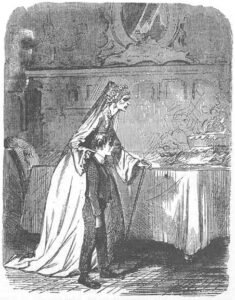Richard Altick’s Victorian People and Ideas presents theories about the kinds of literature Victorians read as well as their motivations for doing so. His theories include that the majority of the reading public belonged to the middle class, and that most of those people who read did so to escape and avoid mental strain, and that they were mostly unable to read serious, well-written literature. In this piece, I will use Altick’s text as a lens to understand the form of The Moonstone by Wilkie Collins, while also exploring the limits to this approach.
Altick argues that many Victorians read for entertainment, not facts, which is partially reflected in the way that The Moonstone is written. The narration is done from several different points of view, and all but one of these accounts are written from the perspective of the future, with the characters recalling past events. In introducing several different viewpoints, the novel provides different interpretations of the events depending on each character’s beliefs and experiences. It also means that each character’s feelings and ideas are also an integral part of the text, which means that much of the novel includes not only the events of the narrative, but also the characters’ worries and anxieties. This makes sense using Altick’s ideas, because he claims that “Because (the majority of readers) possessed virtually no general information, their reading matter had to be devoid of all but the most familiar literary and historical allusions; they could not be expected to waste time puzzling over any more recondite kind” (Altick 61). Using this idea of Altick’s, the need for familiar allusions explains why so much of this novel is dedicated to expressing common anxieties of the time. An example is Miss Clack’s preoccupation with religion, and the fate of her friends’ souls, which reflects the importance that Victorians placed on religion and living by the Church’s moral standards. However, using Altick to understand The Moonstone is limited in that this claim ignores some of the underlying ideas present in the text.
Besides being a novel reflecting common Victorian anxieties and ideas, The Moonstone also has elements of class critique, which seems to be written for the middle class, that Altick states is the majority of the reading public. He argues that the working class did not have the time to read, and the upper class tended to avoid intellectual stimulation. Therefore, the class critique of The Moonstone illustrates both the benefits and limits of using Altick as a lens. The character of Betteredge is an example of a critique of the lower class. Betteredge is the head servant, which gives him exaggerated self-importance and belief in his abilities. He scoffs at Franklin Blake when he proposes to find the moonstone, saying “How can you hope to succeed (saving your prescence) when Sergeant Cuff himself made a mess of it,?” forgetting that Blake is above him (Collins 321). Furthermore, the characters of Mr. Ablewhite, with his contributions to charities such as the Mothers’-Small-Clothes-Conversion-Society and his mother Mrs. Ablewhite, with her refusal to do anything requiring physical or mental exertion are critiques of the upper class, and are satirically exaggerated. This makes sense through Altick’s view that the majority of the novel’s audience would have been middle class. However, this also illustrates a limit to this approach because satire requires a certain level of intellectual capability to understand, and therefore undermines Altick’s claim that the majority of the reading public was uneducated and read only simple texts.
